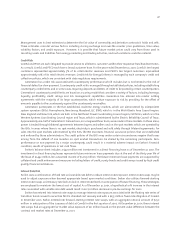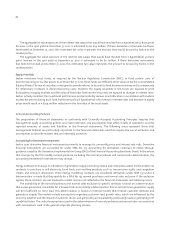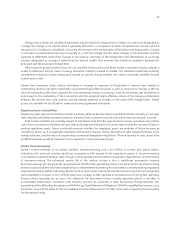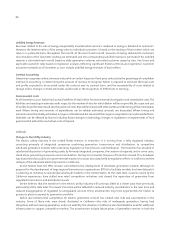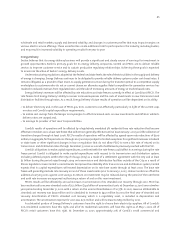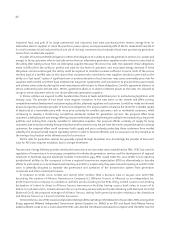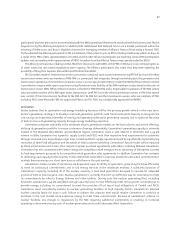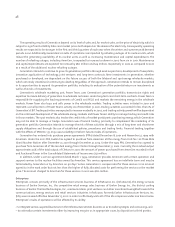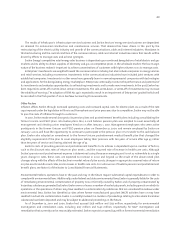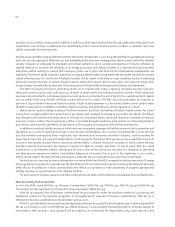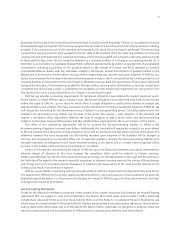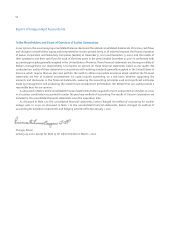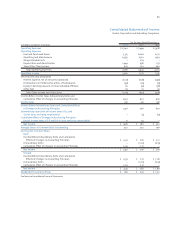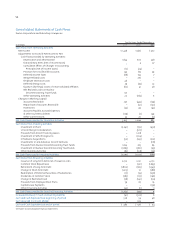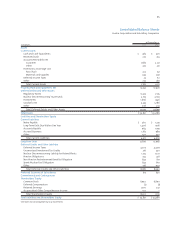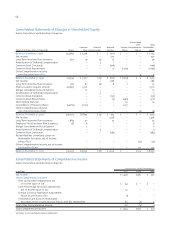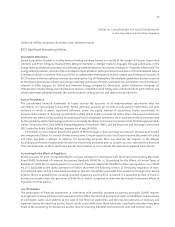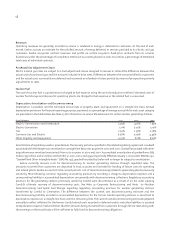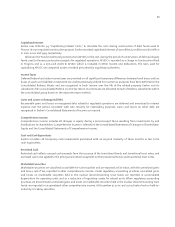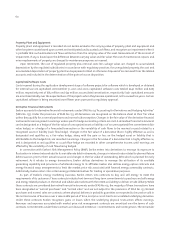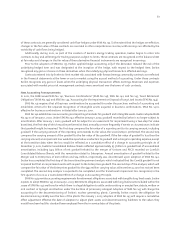ComEd 2001 Annual Report Download - page 53
Download and view the complete annual report
Please find page 53 of the 2001 ComEd annual report below. You can navigate through the pages in the report by either clicking on the pages listed below, or by using the keyword search tool below to find specific information within the annual report.
51
based test, the first step of which must be performed at least annually, or more frequently if events or circumstances indicate
that goodwill might be impaired. The first step compares the fair value of a reporting unit to its carrying amount, including
goodwill. If the carrying amount of the reporting unit exceeds its fair value, the second step is performed. The second step
compares the carrying amount of the goodwill to the fair value of the goodwill. If the fair value of goodwill is less than the
carrying amount,an impairment loss would be reported as a reduction to goodwill and a charge to operating expense,except
at the transition date, when the loss would be reflected as a cumulative effect of a change in accounting principle. As of
December 31, 2001, Exelon’s Consolidated Balance Sheets reflected approximately $5.3 billion in goodwill net of accumulated
amortization, including $4.9 billion of net goodwill related to the merger of Unicom and PECO recorded on ComEd’s
Consolidated Balance Sheets, with the remainder related to Enterprises. Annual amortization of goodwill related to the
Merger and to Enterprises of $126 million and $24 million, respectively, was discontinued upon adoption of SFAS No. 142.
Exelon has completed the first step of the transitional impairment analysis which indicated that the ComEd goodwill is not
impaired but that an impairment exists with respect to the Enterprises goodwill. The second step of the analysis, which will
compare the fair value of the Enterprises goodwill to the $433 million carrying value at December 31, 2001 has not yet been
completed. The second step analysis is expected to be completed, and the transitional impairment loss recognized, in the
first quarter of 2002 as a Cumulative Effect of a Change in Accounting Principle.
SFAS No. 143 provides accounting requirements for retirement obligations associated with tangible long-lived assets.
Exelon expects to adopt SFAS No. 143 on January 1, 2003. Retirement obligations associated with long-lived assets included
within the scope of SFAS No. 143 are those for which there is a legal obligation to settle under existing or enacted law,
statute, written or oral contract or by legal construction under the doctrine of promissory estoppel. Adoption of SFAS No. 143
will change the accounting for the decommissioning of Exelon’s nuclear generating plants. Currently, Exelon records the
obligation for decommissioning ratably over the lives of the plants. The January 1, 2003 adoption of this standard will
require a cumulative effect adjustment effective the date of adoption to adjust plant assets and decommissioning
liabilities to the values they would have been had this standard been employed from the in-service dates of the plants.
The effect of this cumulative adjustment will be to increase the decommissioning liability to reflect a full
decommissioning obligation in current year dollars. Additionally, the standard will require the accrual of an asset related
to the full amount of the decommissioning obligation, which will be amortized over the remaining lives of the plants. The
difference between the asset recognized and the liability recorded upon adoption of the standard will be charged to
earnings and recognized as a cumulative effect, net of expected regulatory recovery. The decommissioning liability to be
recorded represents an obligation for the future decommissioning of the plants, and as a result interest expense will be
accrued on this liability until such time as the obligation is satisfied.
Exelon is in the process of evaluating the impact of SFAS No. 143 on its financial statements, and cannot determine the
ultimate impact of adoption at this time, however the cumulative effect could be material to Exelon’s earnings.
Additionally, although over the life of the plant the charges to earnings for the depreciation of the asset and the interest on
the liability will be equal to the amounts currently recognized as decommissioning expense, the timing of those charges
will change and in the near-term period subsequent to adoption, the depreciation of the asset and the interest on the
liability could result in an increase in expense.
SFAS No. 144 establishes accounting and reporting standards for both the impairment and disposal of long-lived assets.
This statement is effective for fiscal years beginning after December 15, 2001 and provisions of this statement are generally
applied prospectively. Exelon is in the process of evaluating the impact of SFAS No. 144 on its financial statements, and does
not expect the impact to be material.
Forward-Looking Statements
Except for the historical information contained herein, certain of the matters discussed in this Report are forward-looking
statements that are subject to risks and uncertainties. The factors that could cause actual results to differ materially
include those discussed herein as well as those listed in Note 20 of the Notes to Consolidated Financial Statements and
other factors discussed in Exelon’s filings with the SEC. Readers are cautioned not to place undue reliance on these forward-
looking statements, which speak only as of the date of this Report. Exelon undertakes no obligation to publicly release any
revision to these forward-looking statements to reflect events or circumstances after the date of this Report.


